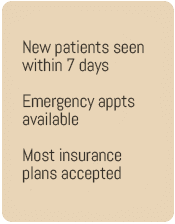Genetics and Hereditary Cancers
A cancer diagnosis can cause anxiety and concern for the person with cancer and their family. For those with a family history of cancer, understanding how genetics factors into hereditary cancers can be helpful.
Your first thought may be to go in for genetic testing to find out if it is a hereditary cancer. Doctors use genetic and genomic tests to study cancer cells that differ from other normal cells.
Genetic testing for cancer can reveal whether family members have inherited genes that increase their cancer risk. Genomic testing reveals insights about the specific genetic changes the cancer has made. The findings can help doctors choose the best way to treat the cancer.
Factors influencing cancer
Every cell in your body holds your genetic code in its dexoxyribonucleic acid or DNA. Your genes are a part of your DNA. Your genes determine cell growth and division, as well as specific biological markers like height, skin color, hair color, body build and more.
Cancer is caused by a gene change or mutation that alters how your cells grow and spread. All genetic mutations do not cause cancer, but every cancer is genetic because it has a genetic basis.
External vs. environmental factors
Most people have heard that smoking can cause lung cancer and tanning can cause skin cancer. These external or environmental factors can influence your likelihood of developing cancer. Exposure to these carcinogens in our environment alters our DNA. Over time, these genetic alterations can change healthy cells into cancerous ones.
When coupled with inherited altered genes, these external factors can lead to an increased risk of developing hereditary cancer. Researchers estimate that 20 to 30 percent of cancers are due to a combination of environmental factors and inherited altered genes.
Random mistakes and genetic variants
Researchers have not identified the common factor influencing cancer. They credit random mistakes or genetic variants that occur as cells divide for causing 60 percent of cancer cases.
These variants may result from environmental or other factors. Often, the body catches and fixes the errors. If one is not caught and continues to copy itself, the genetic variant can become permanent. This variant can be passed down to offspring and become a hereditary cancer risk.
Hereditary cancer factors
Cancer is not a hereditary or inherited disease, which means you cannot pass cancer down to your children. And, if your parent or sibling had cancer, that does not mean you are predestined to get it. Most cancers have no clear link to our parents’ genes.
However, you may have received a genetic variant from your parents that increases your likelihood of developing cancer. This does not mean you will get cancer. It does, however, mean that you have an increased risk.
If you inherited the genetic variant, your cells do not require as many additional mutations to develop cancers as people without the variant. An inherited genetic variant may also increase your likelihood of developing cancer earlier in life.
A rare disorder called family cancer syndrome or hereditary cancer syndrome happens when multiple people in a family inherit genetic variants in cancer-related genes. These variants indicate that family members have a higher risk of developing certain cancers.
Some of the best-known genetic variants are mutations in the BRCA1 and BRCA2 genes, called hereditary breast and ovarian cancer syndrome (HBOC). Mutations in these genes increase the risk of breast, ovarian, prostate, pancreas and other cancers, including melanoma. BRCA testing determines if an individual is predisposed to developing one of these cancers.
Signs of an inherited cancer in a family can include having multiple cancers, rare cancers, multiple family members with the same or related cancers or developing cancer at an early age.
Inherited cancer factors make up only a small percentage of all cancers. Five to 10 percent of cancers are linked to hereditary cancer syndrome, according to the American Cancer Society. This is much less than the environmental and random causes of cancer.
If you inherited genetic variants that increase your risk for cancer, making positive lifestyle modifications can help you prevent cancer. A healthy diet, exercise, healthy body weight, wearing sunscreen and avoiding smoking and second-hand smoke can significantly reduce cancer risk.
Family history of cancer
A family history of cancer is different than an inherited genetic variant or family cancer syndrome. A family history of cancer means you have a family member who has had cancer, but no genetic tie or inherited variant was discovered.
A family medical history of cancer does mean you may have a higher risk of developing cancer. Your family’s shared environment and lifestyle factors could increase your cancer risk. For example, if you and your siblings were exposed to second-hand smoke or untreated radon, multiple family members could develop cancer due to the environmental factors of your childhood.
Sometimes, medical professionals describe a cancer as familial cancer because a statistically high number of family members have a type of cancer without an identified cause.
Genetic testing for cancer
When a cancer diagnosis is given, some families want to have genetic testing to find out if the cancer is due to an inherited variant. A hereditary cancer test can be a preventative measure for those concerned with genetic risk factors.
Generally, genetic testing is not done for people with an average risk of cancer. It is typically recommended for certain situations or for those who have a strong family history of cancer. A genetic counselor can help the family understand whether genetic testing is right for them and what the results could mean for their health.
Genetic testing does not always provide clear results about cancer risk. While a positive result may indicate you have an inherited genetic variant, it does not mean you will develop cancer. The testing may show a genetic change that doctors do not understand.
If you choose genetic testing, work closely with your healthcare team to discuss expectations up front and the results afterward. Then, use those results to develop ways to reduce your risk of developing cancer or catching it early in the process.
Home-based genetic tests are not recommended due to many drawbacks and unclear or uncertain results.
Genome testing and treatment
Genetic testing studies the effects genes have on the body. Genomic testing looks at the structure, function and predictive growth of the DNA and genes. Genome testing is typically used to better understand existing cancers and tumors.
Another way to think of it is that genome testing looks at the full DNA including all of your genes, instead of focusing on a single genetic mutation. This testing helps doctors understand how your body works and how a tumor may behave. It helps to predict the risk, aggressiveness, progression, treatment options and potential recurrence of the cancer.
Personalized Hematology-Oncology uses targeted, precision genome testing to identify the exact cancer genes and personalize the treatment for our patients.
Our physicians examine the genes in cancerous tumors. We look closely at the genome of the cancer and the pathways through which the cancer cells divide.
“All cancers are different, and they behave differently,” says Dr. Castillos, our board-certified oncologist at Personalized Hematology-Oncology. “Our technology allows us to see which genes are up-regulated and down-regulated in the tumor cells. Then we use molecularly targeted therapies to block pathways and specifically treat that cancer.”
Seek treatment for hereditary cancer at Personalized Hematology-Oncology
If you or a loved one have been diagnosed with cancer or have questions about cancer, genetic testing or genomic testing, our staff would be happy to help. We are dedicated to advancing cancer treatment and take a scientific, research-based approach in our clinical decision-making.
Our personalized diagnosis and treatment approach helps lower cancer treatment costs and enables our patients to make decisions that fit their treatment goals.
We look forward to speaking with you. Click here to contact our staff.





